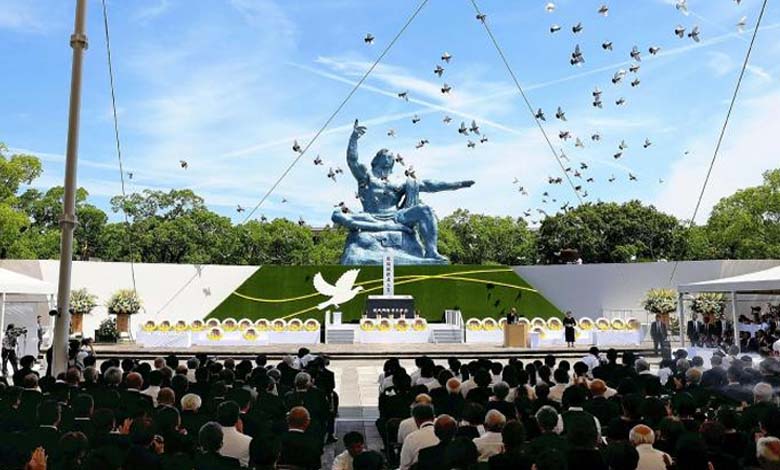Gaza War Casts a Shadow over ‘Nagasaki Anniversary’… Politics Overshadow Humanity

The American ambassador to Tokyo was absent from the 79th-anniversary ceremonies of his country’s atomic bombing of the Japanese city of Nagasaki, protesting the organizers’ decision not to invite the Israeli ambassador due to the war in Gaza.
Instead, U.S. Ambassador Rahm Emanuel attended a prayer at a temple in the Japanese capital alongside his Israeli counterpart Gilad Cohen and British counterpart Julia Longbottom, who also boycotted the anniversary commemoration.
On the morning of August 9, 1945, the United States dropped an atomic bomb on Nagasaki in southern Japan, killing about 74,000 people, many of whom died after the explosion due to radiation exposure.
The attack came three days after a similar strike by Washington on Hiroshima, which killed about 140,000 people.
After these two bombings, Japan announced its surrender in World War II on August 15, 1945. In 2010, former U.S. Ambassador John Roos became the first Washington envoy to participate in the Hiroshima bombing commemoration, followed two years later by his attendance at the Nagasaki anniversary.
Nagasaki Mayor Shiro Suzuki stated that excluding Cohen from the invited guests to the commemoration “was not political,” but rather to avoid potential protests related to the war between Israel and Hamas in the Gaza Strip.
However, Emanuel, former White House Chief of Staff under President Barack Obama, rejected this explanation.
Speaking to reporters on Friday after participating in a prayer at a Buddhist temple, he said, “I believe it was a political decision, not one based on security, given that the Prime Minister (of Japan) attends the ceremony.”
He added that the absence of an invitation to the Israeli ambassador “morally equated Russia and Israel, a state that invaded (Ukraine) with a state that was the victim of an invasion,” referring to Hamas‘s unprecedented attack on Israel on October 7, which triggered the war in Gaza.
Since the beginning of the war in Ukraine in early 2022, Japan has refrained from inviting Moscow and its ally Minsk to the commemorations of the two nuclear bombings.
Emanuel considered that attending the Nagasaki ceremony would have meant “respecting this political evaluation and this political action. I cannot do that in good conscience.”
For his part, Cohen said, “On behalf of the State of Israel and its people, we express our sympathy and stand today alongside the victims of the atomic bomb in Nagasaki, their families, and the people of Japan.”
“A Wrong Message”
Cohen, who attended a similar ceremony in Hiroshima on Tuesday, stated last week that not being invited to Nagasaki “sends the wrong message to the world.”
During the commemoration in the southern city on Friday, Suzuki did not mention Israel directly but expressed concern about global peace in light of the wars in Ukraine and Gaza.
“At a time when no end to the war in Ukraine is in sight and there is fear of escalating armed conflict in the Middle East, we may lose important values that have prevailed in the world so far,” he said.
“We are facing a delicate situation,” he added.
The United States and the United Kingdom sent representatives below the ambassadorial level to Nagasaki, as did Germany, France, Italy, and the European Union.
The positions of the German and British embassies were similar to Emanuel’s, while the French embassy considered the non-invitation of the Israeli ambassador a “regrettable and questionable decision.”
In Washington, the State Department on Thursday defended the ambassador’s stance in Tokyo.
-
9 months after the Gaza War… “Day of Paralysis” in Israel and protests sweep the country
-
“Loophole” in Gaza ceasefire negotiations… Hamas condition clashes with Israeli wall
“I think our position and respect for Japan regarding this anniversary are well-documented and far outweigh the ambassador’s absence from one celebration,” said State Department spokesman Matthew Miller.
Japanese government spokesman Yoshimasa Hayashi on Friday reiterated his refusal to comment on the matter, merely stating that it was up to the organizers of the Nagasaki commemoration.
-
Gaza Ceasefire Negotiations: Progress Toward a Crucial Breakthrough, Hopes for Imminent Resolution
-
The Israeli Dilemma… Who Governs Gaza After the War?
Former U.S. President Barack Obama visited Nagasaki in 2016, although the United States, being the only country to have used nuclear weapons in history, has never apologized for dropping the two bombs.












